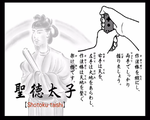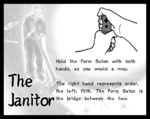WarioWare: Smooth Moves
| WarioWare: Smooth Moves | |||||||||||||||
|---|---|---|---|---|---|---|---|---|---|---|---|---|---|---|---|
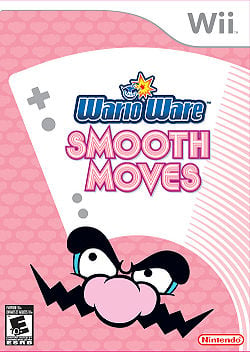 For alternate box art, see the game's gallery. | |||||||||||||||
| Developer | Nintendo SPD Group No.1 Intelligent Systems | ||||||||||||||
| Publisher | Nintendo | ||||||||||||||
| Platform(s) | Wii, Wii U | ||||||||||||||
| Release date | Original release: Wii (Nintendo Selects): Wii U (digital download): | ||||||||||||||
| Language(s) | English (United Kingdom) English (United States) French (France) German Spanish (Spain) Italian Japanese Korean | ||||||||||||||
| Genre | Puzzle | ||||||||||||||
| Rating(s) | Original release:
| ||||||||||||||
| Mode(s) | Single player, Multiplayer | ||||||||||||||
| Format | Wii: Wii U: | ||||||||||||||
| Input | Wii:
| ||||||||||||||
| Serial code(s) | |||||||||||||||
WarioWare: Smooth Moves is the fifth game in the WarioWare series, released as a launch title for the Wii initially in Japan on December 2, 2006. The game showcases and takes full advantage of the Wii Remote and its motion sensor, as microgames are played by placing the controller in numerous positions, called "Forms" in the game, which often invites the player to perform odd actions. All major characters from the previous games return, in addition to the new characters Young Cricket, Master Mantis, Penny Crygor, and Jimmy P. Alongside the microgames and some longer minigames, the game includes a multiplayer mode with several subgames.
This was the first WarioWare game to receive an E10+ rating from the ESRB.
A successor of the game, WarioWare: Move It!, was released in November 2023 for Nintendo Switch.
Story[edit]
A long time ago, humanity was given a mysterious artifact known as the Form Baton. The ancients used this baton in their everyday lives in a large range of movement from rigorous activity to more nuanced actions. The Splunks, a species that lived alongside the ancients, eventually kept the Form Baton in a temple to retain its history.
Many years later, the temple remains in ruins amidst what is now known as Diamond City. Wario drives his bike down the streets, contemplating the day.
| Image | Host/microgame set name | Host greeting |
|---|---|---|
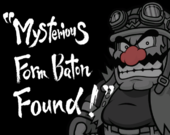
|
Wario Mysterious Form Baton Found! |
"BWAHAHAHA!!! Waaaario here! The other day, I found this crazy stick-thing in these old ruins. I just KNOW it's worth something! All I gotta do now is figure out how it works." |
| Wario's Story: One day, while Wario is at home, eating a pile of sweets, a Splunk suddenly steals all of his food. Angered, Wario chases the Splunk to the Temple of Form and comes across the Form Baton. Wario picks the strange object up and inadvertently sets off a boulder that starts rolling after him. He narrowly escapes the rock and as he leaves the temple, he gloats about his newly-discovered treasure. | ||
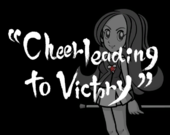
|
Mona Cheerleading to Victory |
"Ciao! I'm Mona! I'm captain of the cheerleading squad, so I know all about form AND batons! Now all I need is an awesome finishing pose!" |
| Mona's Story: Mona, late for an American football game with the Diamond City Roughs against Team Dinosaur, speeds down the streets on her scooter. As she leads the cheerleading routine alongside the rest of the Monettes, one of the player for the Diamond City Roughs, Boy (who has a crush on Mona), gets momentarily distracted before returning his focus on the game. As the Monettes finish their routine, the game is down to only a few seconds. Boy receives the ball and, with the motivation of his crush on Mona, charges through the opposing players and scores a touchdown, winning the game for his team. Later, he tries to admit his attraction to Mona, but hesitates due to being too nervous and ends up accidentally confessing to another Monette while Mona rides off on her scooter. | ||
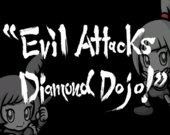
|
Kat & Ana Evil Attacks Diamond Dojo! |
"Hiya! It's me, Kat!" "Ana's here, too!" "We're practicing our forms, 'cause serious ninjas have to know how to move fast!" |
| Kat & Ana's Story: An enormous, red monster called an Elephant Ogre is shown attacking Diamond Dojo, with the Sensei looking worriedly. Kat & Ana immediately start running towards the dojo and split up. Ana enters the dojo and uses her ninjutsu to split herself into four turtles. After navigating the rooms of the dojo, Ana enters the Sensei's room to find a small, red monster called a Li'l Ogre pulling at the Sensei's hair. Meanwhile, Kat is in the middle of fighting against the Elephant Ogre when the Li'l Ogre calls out for the fighting to stop. Afterwards, the Elephant Ogre goes off with what looks like the Li'l Ogre as Kat waves them goodbye. It is soon revealed that the Li'l Ogre is with Kat and that Ana was mistakenly taken by the Elephant Ogre. | ||
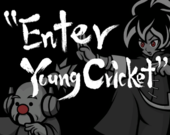
|
Young Cricket & Master Mantis Enter Young Cricket |
"Good to meet you! People call me Young Cricket. As part of my kung-fu training, Master Mantis and I travel around in search of new stances." |
| Young Cricket & Master Mantis' Story: Young Cricket & Master Mantis, hungry from their travels, smell a nearby stand, run by Mona, Mona's Elephant, Mona's Monkey, Mona's Pig, Mona's Bear, Art and Deco, and Joe, selling meat dumplings, with a long line of people waiting to be served. Young Cricket quickly runs across the heads of the people to get to the front of the line. As he makes it to the front, the people behind him become annoyed due to their bruised heads. Young Cricket realizes this and walks over their heads again to get back to the end of the line, where he tells Master Mantis to get in line with him. | ||
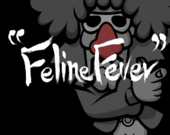
|
Jimmy T. Feline Fever |
"YO! YO! Jimmy T. in the house! I remixed all the moves you've learned so far! Get ready to get down!" |
| Jimmy T.'s Story: While walking down a rainy street, Jimmy sees a cat hiding behind a trash can. Smiling, he props his umbrella above the cat so that it is protected from the weather. As Jimmy continues to walk down the street, the same cat starts to follow him before a bunch of other cats do the same. Soon enough, Jimmy starts to dance, with all of the cats acting as background dancers. They soon take their dancing to Club Sugar. After they finish dancing, all the cats walk out of the club, and as Jimmy watches them leave, the first cat taps him on the back and gives him back his umbrella. | ||
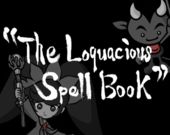
|
Ashley & Red The Loquacious Spell Book |
"I'm Ashley. This is Red. I know all about forms, but who needs forms when you have magic? I'll watch you do them instead." |
| Ashley & Red's Story: Inside the library of Ashley's House, Ashley & Red try to figure out how to make a monster plant. After reading through a book, Red turns into a magic wand that Ashley uses to zap a potted plant. The sapling in the plant quickly grows into a normal flower. Ashley gets irritated by the failure of her experiment, but the Chatty Mr. Spell Book enters and says that he has an idea. A bit of time passes, and the Spell Book says that she's now ready. She fires the spell at a second potted plant, which very quickly grows into a monstrous plant that grows so large, it breaks through the walls and roof of the mansion. As Red cowers in fear, Ashley gives a little smile. | ||
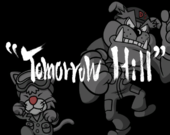
|
Dribble & Spitz Tomorrow Hill |
"Dribble here. Good to meet ya." "Yeah, and I'm Spitz." "Our cab will take you anywhere you wanna go! So, where to today?" |
| Dribble & Spitz's Story: As Dribble & Spitz wash their taxi, a young woman walks up to them and asks if she can get a ride. When they're all in the car, she says that she wants to go to Tomorrow Hill. Dribble revs up the car and takes it on the road while Spitz turns on the radio. Once they've arrived at their destination, the woman leaves the taxi and starts to walk towards the edge of the hill. Dribble & Spitz are soon stupefied when an enormous UFO flies in front of the hill and the woman transforms into an alien. As she's beamed back onto the ship, she waves goodbye to her drivers before the ship flies away. As the spaceship leaves, Spitz realizes that the woman did not pay her fare. | ||
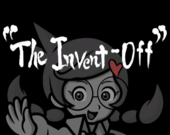
|
Penny The Invent-Off |
"Hi there. I'm Penny Crygor. You probably know my grandpa 'cause he's a famous inventor. I wanna be just like him, so I spend most of my time in the lab at school!" |
| Penny's Story: At the Diamond Academy, Penny and her grandfather, Dr. Crygor, prepare for a competition known as the "Invent-Off" in a wrestling ring. Penny tells him to watch out after initiating her competition sequence. Mike is seen cheering from Dr. Crygor's side of the ring, and an audience of what appear to be Mr. Game & Watches are cheering from outside the ring. A screen in the middle starts to display Penny's invention, a Wario-themed motorbike. After some time has passed, Penny shows off her completed invention, wowing her grandfather and causing him to admit defeat. With Penny declared the winner, she, her grandfather, and Mike all start to sing while her invention rides around. | ||
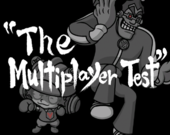
|
9-Volt & 18-Volt The Multiplayer Test |
"'Sup! 9-Volt here. I'm Nintendo's #1 fan! I've got a ton of old games! Stop by and give 'em a whirl!" |
| 9-Volt & 18-Volt's Story: At 9-Volt's House, 9-Volt is showing off his new Game & Watch to 18-Volt. 9-Volt starts to play it, and 18-Volt gets jealous, causing him to grab one of the sides. As the two of them pull, the Game & Watch accidentally breaks in half. Angered, 9-Volt shouts at 18-Volt to get out of his house. Later, 18-Volt goes to Toy Express to look for a replacement Game & Watch, but does not find one. Across the street, he notices a shop (run by Shop Manager Iwata) that has gained some attention. Soon enough, Iwata shows off a Game & Watch, and 18-Volt reaches for it. He then notices that 9-Volt is next to him, also reaching for it, and the two soon reconcile. | ||
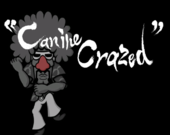
|
Jimmy P. Canine Crazed |
"YO! YO! Jimmy P. in the house! I remixed all the moves you've learned so far! Get ready to get down! What's that? I remind you of someone? I have no idea what you're talking about." |
| Jimmy P.'s Story: While walking down a sunny street, Jimmy sees a dog hiding behind a trash can. Smiling, he gives a bone to the dog, which happily barks in response. As Jimmy continues to walk down the street, the same dog starts to follow him before a bunch of other dogs do the same. Soon enough, Jimmy starts to dance, with all of the dogs acting as background dancers. They soon take their dancing to Club Spice. After they finish dancing, all the dogs walk out of the club, and as Jimmy watches them leave, Jimmy T. taps him on the back and gives him an odd look. | ||
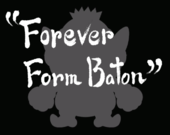
|
Tiny Wario Forever Form Baton |
"BWAHAHAHA! I'm Wa- - Hey?! What's that over there?! STRAWBERRIES?! My favorite! They're mine! Mine mine MINE!" |
| Tiny Wario's Story: Wario is at his house when he gets a package in the mail. Inside the package is the pink bike that Penny made at the Invent-Off. Wario gleefully takes it out for a ride, despite him being much too large for it, but he suddenly starts shrinking before eventually getting sucked into the bike. Out of its exhaust pipe, the bike shoots out a bunch of Tiny Warios. The Tiny Warios start to roam around before they notice a field of strawberries, and they soon swarm it. After a while, they all jump into one pile and become the standard Wario. However, he is soon chased by the Splunks, who want their Form Baton back. Wario is eventually chased into the Temple of Form but ends up tripping, dropping the Form Baton, and inadvertently placing it back where it belongs. A Splunk thanks him for giving it back. | ||
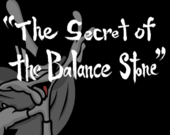
|
Orbulon The Secret of the Balance Stone |
"Greetings, earthling. I am Orbulon. My stage requires that you connect the Balance Stone to the Form Baton. I will show you a mysterious form I learned on a remote planet. It's called The Diner!" |
| Orbulon's Story: Orbulon is flying his Oinker in Outer Space when a Balance Stone suddenly comes rocketing at him, hitting his ship and causing him to crash into the Temple of Form. Inside the temple, he is flung out of his ship and lands right in front of the Balance Stone and the Form Baton. When he picks up both of the objects, the temple suddenly emerges from the ground and starts floating. Orbulon panics but notices some writing on the wall that explains how to use the Form Baton and Balance Stone. Afterwards, he takes control of the temple and brings it to space. Once in space, he claims it for himself, but the Splunks, still inside the temple, tell him to give it back, and as they fight Orbulon, the temple crashes back on the ground. Orbulon and his Oinker are soon jettisoned back into space. | ||
Gameplay[edit]
As with previous WarioWare titles, Smooth Moves is structured around completing short, simple tasks (dubbed "microgames"), which increase in speed and difficulty as the player progresses. The various microgames are divided into sets hosted by a WarioWare character. Unlike previous WarioWare games, most of the character sets do not have a clear differentiation in theme or control method, apart from ways to hold the ![]() (dubbed "forms") being progressively introduced.
(dubbed "forms") being progressively introduced.
Most microgames solely use motion controls, though an handful of games require pressing ![]() and one set uses the
and one set uses the ![]() + Nunchuk combo. Before each microgame, a "form card" appears briefly to show the player how to hold the
+ Nunchuk combo. Before each microgame, a "form card" appears briefly to show the player how to hold the ![]() .
.
Between each set, the player can select a map icon named "Temple of Form" to practice unlocked microgames, which are grouped by both microgame sets and forms. Unlike previous WarioWare games, the player cannot set scores for individual microgames as the session automatically ends after going through each difficulty level.
Wii Remote Forms[edit]
- Main article: Form Baton
In the game, the microgames use different variations of holding the Wii Remote, called Forms. These positions are the following:
Microgames[edit]
- Main article: List of WarioWare: Smooth Moves microgames
The game features 205 microgames in total, all of which have three difficulty levels and various speed settings. The microgames are divided by characters, which host a varying number of microgames each. One game, Bungii!, can appear in two specific sets and only appears after a specific microgame in those stages.
Microgame sets[edit]
In addition to the stages played during the storyline, there is a handful of microgame mixes with special characteristics. None of these sets feature games from Orbulon's set.
| Image | Name | Japanese name | Description |
|---|---|---|---|
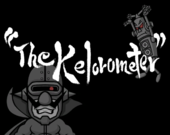
|
The Kelorometer |
やせる!?ダイエットマシーン Yaseru!? Daietto Mashīn (Lose Weight?! Diet Machine) |
Hosted by Dr. Crygor and Mike, this set features a random assortment of microgames featuring a higher-than-average amount of physical movement. After playing 20 microgames, the player is graded on how many "kelories" they have lost. |
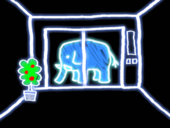
|
All Mixed Up |
ごちゃまぜ Gochamaze (Jumbled Together) |
Represented by a blue elephant building, this mix features almost every microgame played at increasing speed and difficulty. Level-ups occur after 20 and 40 microgames with the boss stage occurring every 100 games.[8] Finishing with a high score of 30 points or more unlocks the Super Hard set. |

|
Super Hard |
げきむず Gekimuzu (Extremely Difficult) |
Represented by a red elephant building, this set is played at the highest speed setting from the start with all the microgames at their lowest difficulty level. Finishing with a high score of 20 points or more unlocks the Sudden Death set. |
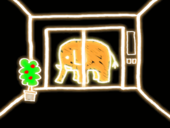
|
Sudden Death |
スリリング Suriringu (Thrilling) |
Represented by a yellow elephant building, this set gives the player one life and has every microgame starting at the highest difficulty level. Finishing with a high score of 10 points or more unlocks the Thrilling set. |
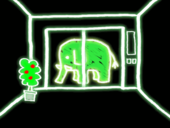
|
Thrilling |
ぬきうち Nukiuchi (Unexpected) |
Represented by a green elephant building, this set does not show Form cards before playing each microgame. Finishing with a high score of 20 points or more unlocks the Sound Studio. |
Minigames[edit]
In addition to microgames, there are minigames which can be unlocked by completing a certain stage in story mode.
Single-player[edit]
These minigames are extended versions of existing microgames (excluding Pyoro S).
| Image | Name | Description | Unlock criteria |
|---|---|---|---|
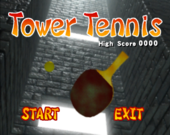
|
Tower Tennis | Most likely an extended version of Serve Already!, the player controls a disembodied hand holding a ping-pong paddle which is used to bounce a ball. The screen scrolls vertically and the player has to use the ball to destroy or avoid blocks barring the way. The game ends in a loss if the ball falls off-screen. | Complete Evil Attacks Diamond Dojo! |
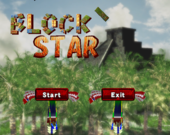
|
Block Star | An extended version of the boss microgame Block Party, the player maneuvers a platform on the bottom side of the screen to catch falling shapes and hold the complete structure for three seconds without having any of its components falling off-screen. The game features 50 levels divided into 5 sets of 10, whose individual stages can be completed in any order before moving on to the next set. | Complete Enter Young Cricket |
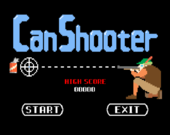
|
Can Shooter | A shooting gallery-style game that serves as an extended version of Shoot the Breeze, the player has to shoot cans and other objects while destroying enemy projectiles and making sure to stay within the time limit. Floating power-ups cans periodically appear and can be destroyed to extend the timer, slow down time or upgrade the crosshair. | Complete The Loquacious Spell Book |
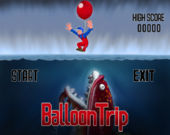
|
Balloon Trip | A 3D version of Balloon Fight's Balloon Trip mode that serves as a similar and endless version of Balloon Fight, the player controls the Balloon Fighter by flapping the Wii Remote and the Nunchuk. The goal of the game is to collect balloons while avoiding floating sparks, enemy balloon fighters and fish jumping out of the water. | Complete The Kelorometer |
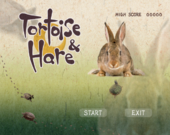
|
Tortoise & Hare | An extended version of Hare Raising that is also played using both the Wii Remote and the Nunchuk, the player has to maneuver the two controllers following on-screen prompts. | Complete The Secret of the Balance Stone |
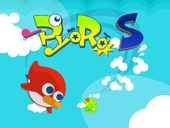
|
Pyoro S | A vertical shoot-'em-up-like game where the player controls Pyoro. Pyoro attacks enemies by sticking out his beak. Gulping an entire formation of enemies gives a point bonus and make apples appear, which have different effects depending on their color. | Unlock every microgame |
Multiplayer[edit]
Alongside the single-player minigames are a set of games meant specifically for multiplayer. These games are unlocked naturally as the game progresses. Some of them are based around playing sets of microgames (besides boss microgames and Orbulon's microgames), while others are separate minigames. Players compete in these minigames as Miis.
| Image | Name | Description | Unlock criteria |
|---|---|---|---|
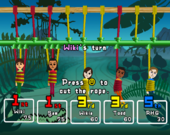
|
Lifeline | Players compete for points by trying to win microgames. Winning the microgame gains points (dependent on how much the microgame was worth) while losing it gains nothing. After a handful of rounds, the players are tied up and suspended over a lake of crocodiles. The players take turns cutting ropes, and the last man standing wins. | Play Bomb for the first time |
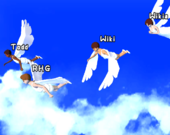
|
Survival | The players are angels flying above the clouds. Each player plays one microgame. If they win, they continue to survive; however, if they lose, they start to fall and are eliminated. After every player has played once, the difficulty and speed increase. The last person remaining wins. | Complete Forever Form Baton |
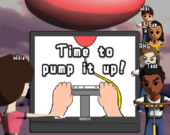
|
Balloon | At the beginning of the round, the first player gets a chance to fill a balloon with air. Afterwards, they play a microgame, while the other players fill it with air. If they win, someone else goes to fill the balloon, and if they lose, they play another microgame. If the balloon pops, that player loses and the others win. | Play Lifeline for the first time |
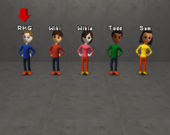
|
Bomb | A player is randomly chosen to play a microgame. If they win, they choose another player and what form their microgame will use. Repeating a certain form will increase its difficulty. If a player loses a microgame or if they take too long to choose someone, one loses and the other players win. | Play Survival for the first time |
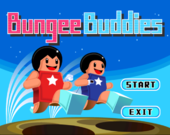
|
Bungee Buddies | Two players use a connecting Wii Remote and Nunchuk to progress through a path. Along the way are various pits and other obstacles, which they need to avoid by physically jumping. In the end, their total distance and their compatibility are shown. | Play Star Nose for the first time |
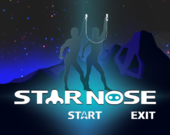
|
Star Nose | Two players pilot a nose-shaped spaceship using a connecting Wii Remote and Nunchuk. They gain speed by eating food scattered along the way. Whoever eats three food first or does not crash wins, at which point they place themselves on the nose of a couple. | Play Darts for the first time |
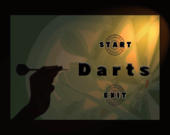
|
Darts | Up to four players compete in a game of darts; each player takes turns throwing darts at a board, each section of the board corresponding to different point values, to reach exactly 301 points. Whoever gets there first wins. | Complete Forever Form Baton |
Regional differences[edit]
Similarly to previous installments in the series, the localization of WarioWare: Smooth Moves includes not only text adaptation, but graphical and sound changes as well, which are listed below.
Forms[edit]
- Of the 19 forms featured in the game, 13 were adapted for the international versions. The Japanese names for the forms, derived from that nation's culture and history, were replaced with names more easily recognized in the West and internationally. Consequently, the artwork used for each respective form explanation was either edited or completely redrawn. The complete list can be found here.
- The form explanation music uses Japanese instruments in the original game. The localization exchanges it for a different track, which uses piano and digital sounds instead. The form explanation music in the Korean release uses Korean instruments.
- Each language features its own voice actor for the form explanations and slight variations in style. According to series developer Goro Abe, the Japanese version was intended to emulate "Japanese language courses that are broadcast on TV abroad", with a English-speaking Canadian developer providing the voiceover.[9]
Microgames[edit]
- In the Japanese and Korean versions, the narrator announces the form to be used before each microgame along with the visual card. The American and European versions drop the oral cue entirely.
- In the Japanese and Korean versions, the microgame speed-increase prompt says "Speed Up!", while in the English version, it says "Faster!", similar to WarioWare: Twisted!
- In the first level of Stir Crazy, the Japanese version has the player grinding rice for soba. This was changed to grinding herbs for spaghetti in the localized versions.
- In the second level of the Korean version of Extreme Patty-Cake, the volcano is replaced by a big flower.
- In the international versions of Biggest Fan, the image of the fan was changed from the Japanese kanji 祭 (festival) to an image of a bird.
- In Produce Stand-Off, the international versions changed the color of the suit the enemy wears for all three levels. In addition, the Korean version changes the weapon that the player and enemy wield from swords to wooden sticks.
- The Korean version of Cold Call changes the people who pick up the phone from Japanese medieval nobles to Korean medieval nobles.
- Level 2 of Teeth Polithe ends with the old woman biting a corn cob, which in the Japanese original is a senbei. The background and her clothes are also traditionally Japanese in the original, while the localization sets the game at a beach and dresses the woman in a pink jacket and visor.
- In the Japanese version of Saving Face, the woman wears a red dress. Other versions have her wearing a turtleneck sweater and jeans instead.
- In most international versions of Bell Captain the player hits the bell with a mallet, which replaces the suspended wooden beam from the Japanese game. The Korean version keeps the beam but changes the background to a red Buddhist temple in front of the night sky.
- In the first level of the Japanese version of When in Rome…, the hands wield lightsabers. These were replaced with candy canes for international releases.
- Super Nostalgic Entertainment System features a Famicom and Famicom games (Super Mario Bros., Duck Hunt, Tennis and Devil World) in the Japanese and Korean versions, which were changed to a SNES and SNES games (Super Mario World, Mario Paint, Wario's Woods, Pilotwings, and Super Metroid) in other versions.
- The Korean version has a unique design for Three's a Crowd. Replacing the traditional Japanese setting for a jungle, the microgame involves a regular Wario whacking a monkey (originally a ninja) before it steals his pile of bananas (originally a woman).
- The first opponent of Boom Box originally wears a turban and sports a mustache and a goatee, while in the international games he wears an afro with a bird's head popping out and no facial hair. The third opponent wears this same afro in the Japanese version and has pinkish lips, while other versions make him bald and his lips darker to closely match his skin tone.
- In the Korean version of Hare Raising, the red flag is replaced by the blue flag.
Other[edit]
- The music played on the title screen is different in the Japanese version of the game, which uses the Temple of Form theme. In other editions of the game, the title music is a cover version of the title theme from WarioWare, Inc.: Mega Microgame$!
- With the release of the Korean version of Smooth Moves, all of the artwork of the Wii Remote (Form Baton) includes a Wii Remote Jacket.[10] All other versions of the game use artwork of Wii Remotes without it. This difference only applies to the manual, websites, and advertisements.[11]
- The note attached to the package Wario got in Tiny Wario's opening cutscene says "From Penny". The "From" part of it is removed in the European version, most likely to accommodate for the fact that the game was released in English, French, German, Italian and Spanish there.
- In the opening and closing cutscenes from Kat and Ana's sequence, the man has a long gray beard in the Korean versions and a samurai ponytail in other versions.
- In Ashley's opening cinematic, Red blows a bubble out of his nose while sleeping in the Japanese and Korean versions.
- In 9-Volt's opening cinematic, the Japanese version has a Famicom while international versions have an NES. Additionally, the phrase that appears with 9-Volt saying the first part and 18-Volt saying the other part is "Love Game" in the Japanese version and "Game Boys" in international versions.
Development[edit]
The idea for a WarioWare game on the Wii came shortly after WarioWare: Smooth Moves's director, Goro Abe, and producer, Yoshio Sakamoto, first saw the Wii's controller.[9][12] The game's development started with around twenty people, with others coming and going, but the number remained relatively consistent.[13] From the start, multiplayer was a big aspect in the development of the game, and the idea was that one person would play the game while the others around them enjoyed the comical positions.[12][13] While teams working on other projects were worrying about how to fully utilize the Wii controller, Abe and Sakamoto had great optimism for the system, saying that "If you’ve got one of these Remotes, you can pretty much do anything".[9]
The various positions came into play when the development team realized that restricting the Wii controller's to one way limited the amount of entertainment, which led to the discussion of which positions would and would not work.[12] Microgames were decided mostly by the developers writing down ideas, sending them to Abe, and having him pick out the ones he liked, after which they began to design the ones that were picked.[12] The developers and designers were often asked to create a unique design for the microgames, giving the desired effect of having a wacky environment.[12] Feedback about the previous WarioWare games and suggestions for improving them were looked into but were disregarded if they did not fit with their idea.[12]
Reception[edit]
Critical reception[edit]
WarioWare: Smooth Moves received generally favorable reviews, holding a score of 83 on Metacritic[14] and a score of 82 on GameRankings.[15]
Many critics complimented the game on its controls and its multiplayer,[16] though it was criticized for its short length.[17] It received a score of 34/40 from Famitsu (around 85%),[18] while the Official Nintendo Magazine gave it a 92%, commenting that Wario should "take his place alongside Mario and Link as a true Nintendo great".[19] Eurogamer gave the game a 70%, complimenting the game's "beautiful" use of the controls and "superb" humor, but criticizing that it is "short on long-term appeal" because it does not "dare to test players".[20]
| Reviews | |||
|---|---|---|---|
| Release | Reviewer, Publication | Score | Comment |
| Wii | Jeff Gerstmann, GameSpot | 9.1/10 | "The WarioWare series has never come at a more perfect time. With the Wii just getting established, a game that shows off the range of motions you can accomplish with the Wii Remote is a perfect companion. But it's more than just a demonstration of the Wii's technology; it's also a terrifically charming, funny, and nefariously addictive game that you can play alone. But it gets even better when you have a crowd on hand to witness the weirdness with you." |
| Wii | Gerald Villoria, Gamespy | 4.5/5 | "I had a great time with Wario Ware[sic]: Smooth Moves, and you'll get a lot of value out of the game if you're the type that hosts parties or if you have a group of friends or family already that are enjoying games like Wii Sports or Rayman: Raving Rabbids together. There are some nice surprises in the package which I've tried to avoid spoiling, some particularly entertaining boss fights, and best of all, an excellent collection of games that can be played for longer than just a few seconds. If you've played previous Wario Ware games, then feel confident that while this may not be the best or most original entry in the series, it's still quite good. If you're new to micro-gaming, then be bold, take that first step, and don't look back. Hurry up, because it's my turn next." |
| Wii | Kristan Reed, Eurogamer | 7/10 | "There's no question that Smooth Moves is a wonderful addition to the Wii at a time of the year when hardly anything else is being released, but we can't deny that we were expecting much more from Nintendo. The way the game utilises the controller is beautiful and - as ever - the humour superb, yet it's a game short on long-term appeal because it never really dares to test players. Much like Touched!, its focus appears to be more of a snappy technology demonstration than of providing a lasting challenge, and it's puzzling why Nintendo and Intelligent Systems couldn't have delivered on both counts. The multiplayer mode certainly extends its lifespan a little, but, again, it's a story of massive untapped potential. Let's hope that now the introductions are out of the way, Nintendo can beef up the content for the inevitable release of the next WarioWare." |
| Aggregators | |||
| Compiler | Platform / Score | ||
| Metacritic | 83 | ||
| GameRankings | 81.82% | ||
Sales[edit]
For its US launch, WarioWare: Smooth Moves was the best-selling Wii game of January 2007 and the fourth best-selling game of the month according to NPD data.[21] Smooth Moves debuted in Japan with around 63,000 units sold. By 2014, the game had sold around 658,000 units in the region according to Famitsu sales data.[22]
In the UK, the game debuted at the No. 2 spot, behind Lost Planet: Extreme Conditions.[23] In Europe, the game was re-released as part of the Nintendo Selects range, budget rereleases of commercially successful titles.
By the end of the first quarter of 2007, Smooth Moves had sold 1.82 million units worldwide.[24]
Awards[edit]
It won IGN's Best Action Game award at its Wii Best of E3 2006 Awards[25] and was later named the site's Game of the Month for January 2007.[26] It has also received an award in the Trend and Lifestyle category at the 2007 Nuremberg International Toy Fair.[27]
Gallery[edit]
- For this subject's image gallery, see Gallery:WarioWare: Smooth Moves.
Media[edit]
- For this subject's sound test, see Sound Studio.
| File info |
| File info |
| File info |
| File info |
| File info |
| File info |
| File info |
| File info |
| File info |
Quotes[edit]
- Main article: List of WarioWare: Smooth Moves quotes
- "BWAHAHAHA!!! Waaaaario here! The other day, I found this crazy stick-thing in those old ruins. I just KNOW it's worth something! All I gotta do now is figure out how it works."
- "Letting the Form Baton fall is like letting a mohawk droop: shameful and forbidden."
- "This stance honors the CEO, unsung hero standing proud on the backs of his employees."
- "Like riding a bicycle, perfecting this stance requires grace, steadiness, and tight shorts."
- "Remember, cans are your mortal enemies!"
Pre-release and unused content[edit]
The E3 2006 demo did not feature the Elephant form and some of the microgames featured different graphics and instructions. The "Big Cheese" form was originally named "The Big Kahuna".[28]
Staff[edit]
- Main article: List of WarioWare: Smooth Moves staff
The game was a coproduction between Intelligent Systems and Nintendo SPD Group No.1. Goro Abe is the director and Yoshio Sakamoto is the producer, as with most WarioWare games. The game was Yoichi Kotabe's last credited work as a full-time employee of Nintendo before he departed from the company.
During the credits, each member of the development team is represented by a Mii avatar. The player can place a hole under each Mii as they take a bow, the amount they trap is recorded and kept as a high score.
References to other games[edit]
- Donkey Kong: Opening Night uses the level start song from Donkey Kong as well as Donkey Kong and Mario's sprite, as well as a recolored version of Mario's sprite made to resemble Luigi.
- Tetris: Except for Bowser, all the characters from the Hard B mode of Tetris make a return playing various musical instruments in level 3 of Opening Night. Of them, only Samus retains her instrument.
- Super Mario Bros.: A microgame titled Super Mario Brothers involves Mario hitting a set of blocks to obtain coins. Opening Night reuses Toad and Peach's sprites as well as the overworld theme. Super Mario Brothers, Sifty Character, and Super Nostalgic Entertainment System also use the game's theme; in the last, the game itself may also appear as one of the cartridges used.
- Super Mario Bros. 3: Opening Night reuses several themes from Super Mario Bros. 3.
- Dr. Mario: The level settings song is used in Opening Night.
- Super Mario World: The game's cartridge is one of the ones used in the microgame, Super Nostalgic Entertainment System.
- Mario Paint: The game's cartridge is one of the ones used in the microgame, Super Nostalgic Entertainment System.
- Wario Land: Super Mario Land 3: A microgame named Wario Land revolves around Wario throwing a Pirate Goom.
- Wario's Woods: The game's cartridge is one of the ones used in the microgame, Super Nostalgic Entertainment System.
- Paper Mario: A microgame's title, Paper Wario, is based on Paper Mario's title.
- Super Mario Sunshine: One of the microgames, called Super Mario Sunshine, has the player extinguish a fire with Mario and FLUDD.
- WarioWare, Inc.: Mega Party Game$!: The Balloon Bang multiplayer minigame returns in the form of Balloon. Balloon uses rearranged jingles and the same air pump sound as Balloon Bang.
- WarioWare: Twisted!: Three microgames from Twisted! are included in the microgame WarioWare: Twisted!: Iron Stomach, Cutting It Close, and Hat's Off. The couple seen in Tearful Reunion resemble the couple from Rocky Reunion.
References in later games[edit]
- WarioWare: D.I.Y.: During the break scene in Ashley's stage, she can wear a mask which looks identical to the skull on Chatty Mr. Spell Book.
- Game & Wario: A Call Code features a group of people playing the game while talking to the player via telephone.
- WarioWare Gold: 32 of the 205 microgames are carried over to Gold. Music from Smooth Moves reappears as souvenirs. In Mona's character trailer, the Smooth Moves version of her is shown as a cameo.
- WarioWare: Get It Together!: Mona's cheerleader baton and a football appear in her room during the intro of her story. The man from Wet Your Whistle and Boom Box appears in Blended? Splendid! When the "Boss Stage" text appears in Jimmy T's stage, the five figures in the background do a dance from Wario Dance Company.
- WarioWare: Move It!: This game is a successor to WarioWare: Smooth Moves, with the Japanese name of WarioWare: Move It! (Chō Odoru Meido in Wario, "Super Dancing Made in Wario") being based on the Japanese name of WarioWare: Smooth Moves (Odoru Meido in Wario, "Dancing Made in Wario"). The microgames in WarioWare: Move It! are again controlled with motion controls; in particular, the simultaneous usage of one controller in each hand is similar to the microgames in Orbulon's stage in WarioWare: Smooth Moves. The Code Dependency microgame returns.
Names in other languages[edit]
| Language | Name | Meaning | Notes |
|---|---|---|---|
| Japanese | おどるメイド イン ワリオ[?] Odoru Meido in Wario |
Dancing Made in Wario | |
| Chinese | 舞動壞莉歐工作室[29] Wǔdòng Huàilìōu Gōngzuòshì |
Dancing Wario Studio | |
| Korean | 춤춰라 메이드 인 와리오[?] Chumchwora Meideu In Wario |
Dance Made in Wario |
Notes[edit]
- The instruction guide is presented as a newspaper called "The Weekly Wario", and explains several elements of gameplay under the guise of random "stories", though it only has one issue because Wario was too lazy to write a second one. On page 18 of the instruction booklet for the game, Wario says the next issue will be out "whenever he feels like it".
- On the Nintendo Channel, one video incorrectly named the game as WarioWare: Smooth Grooves.[30]
- The instruction booklet released in North America has a mistake on page 22. The bottom of the page is written in English while the section of the instruction booklet is supposed to be in French.
- It is revealed that Wario is wearing a white pair of underpants with blue polka-dots if the player clicks the Wario icon and waits for a few seconds.
- This is the first WarioWare game to give Wario unique voice clips instead of recycled ones.
References[edit]
- ^ おどる メイド イン ワリオ. Nintendo Co., Ltd. (Japanese). Retrieved December 2, 2023.
- ^ a b WarioWare: Smooth Moves | Wii | Games | Nintendo UK. Nintendo UK (British English). Retrieved December 2, 2023. (Archived via Wayback Machine.)
- ^ Super Smash Bros. Brawl Chronicle
- ^ News from Nintendo. Nintendo of Australia (Australian English). Archived January 26, 2007, 01:42:36 UTC from the original via Wayback Machine. Retrieved January 23, 2025.
- ^ https://www.nintendo.com/en-za/Games/Wii/WarioWare-Smooth-Moves-283850.html
- ^ Wii. Nintendo of Korea (Korean). Archived June 14, 2009, 17:59:45 UTC from the original via Wayback Machine. Retrieved February 8, 2010.
- ^ おどる メイド イン ワリオ | Wii U | 任天堂. Nintendo (Japanese). Retrieved June 25, 2024.
- ^ Lithium Sulfate (May 12, 2009). Wario Ware: Smooth Moves - All Mixed Up (Blue Elephant) - 179pts (2/3) (04:02). YouTube. Retrieved June 25, 2024.
- ^ a b c Iwata Asks with Abe and Sakamoto. Nintendo of America (American English). Retrieved June 25, 2024.
- ^ Wii. Nintendo of Korea (Korean). Archived June 14, 2009, 17:59:45 UTC from the original via Wayback Machine. Retrieved June 25, 2024.
- ^ 하토Hato (July 30, 2018). 춤춰라 메이드인와리오 조작법/WarioWare Smooth Moves All Form(Korean)/おどるメイド イン ワリオ 作法(韓國語). YouTube (Korean). Retrieved October 31, 2023.
- ^ a b c d e f Ferguson, Stan (May 17, 2006). WarioWare: Smooth Moves E3 Interview. Nintendo World Report (English). Retrieved June 25, 2024.
- ^ a b Casamassina, Matt (May 30, 2006). Interview: WarioWare: Smooth Moves. IGN (English). Retrieved June 25, 2024.
- ^ WarioWare: Smooth Moves. Metacritic (English). Retrieved June 25, 2024.
- ^ WarioWare: Smooth Moves for Wii. GameRankings (English). Archived March 7, 2009, 04:25:36 UTC from the original via Wayback Machine. Retrieved June 25, 2024.
- ^ Villoria, Gerald (January 23, 2007). Wario Ware: Smooth Moves. GameSpy (English). Retrieved June 25, 2024.
- ^ Young, Jason (January 26, 2007). WarioWare: Smooth Moves. Gaming Target (English). Retrieved June 25, 2024.
- ^ IGN Staff (November 21, 2006). Famitsu Rates Wii. IGN (English). Retrieved June 25, 2024.
- ^ East, Tom (January 9, 2008). Wii Review: WarioWare: Smooth Moves. Official Nintendo Magazine (British English). Archived August 9, 2011, 07:33:53 UTC from the original via Wayback Machine. Retrieved June 25, 2024.
- ^ Reed, Kristan (January 16, 2007). Wario Ware: Smooth Moves. Eurogamer (English). Retrieved June 25, 2024.
- ^ Hatfield, Daemon (February 21, 2007). NPD: Best-Selling Games January 2007. IGN. Retrieved June 25, 2024.
- ^ Lemaire, Oscar (January 25, 2014). Ventes des jeux Wario au Japon. Gamescharts (French). Archived January 29, 2014, 16:43:12 UTC from the original via Wayback Machine. Retrieved June 25, 2024.
- ^ Orry, James (January 16, 2007). UK Video Game Chart: Lost Planet finds itself at No.1. VideoGamer (English). Archived September 8, 2015, 04:22:00 UTC from the original via Wayback Machine. Retrieved June 25, 2024.
- ^ Casamassina, Matt (July 25, 2007). Nintendo Sales Update. IGN (English). Retrieved June 25, 2024.
- ^ IGN Staff (May 19, 2006). Wii Best of E3 2006 Awards. IGN (English). Retrieved June 25, 2024.
- ^ Bozon, Mark (February 1, 2007). Game of the Month: January 2007. IGN. Retrieved June 25, 2024.
- ^ Sinclair, Brendan (January 30, 2007). Wii, Wario win ToyAward. GameSpot (English). Retrieved June 25, 2024.
- ^ August 2006. Nintendo Power Volume 206. Nintendo of America (American English). Page 61.
- ^ Wii遊戲軟體. Nintendo of Taiwan (Traditional Chinese). Archived January 22, 2013, 21:01:32 UTC from the original via Wayback Machine. Retrieved June 25, 2024.
- ^ What's wrong with this picture? (JPG). Go-Nintendo. Archived February 27, 2015, 15:00:47 UTC from the original via Wayback Machine. Retrieved June 25, 2024.
External links[edit]
- European English website
- Australian website
- Japanese website
- American English instruction booklet
- Japanese instruction booklet



















